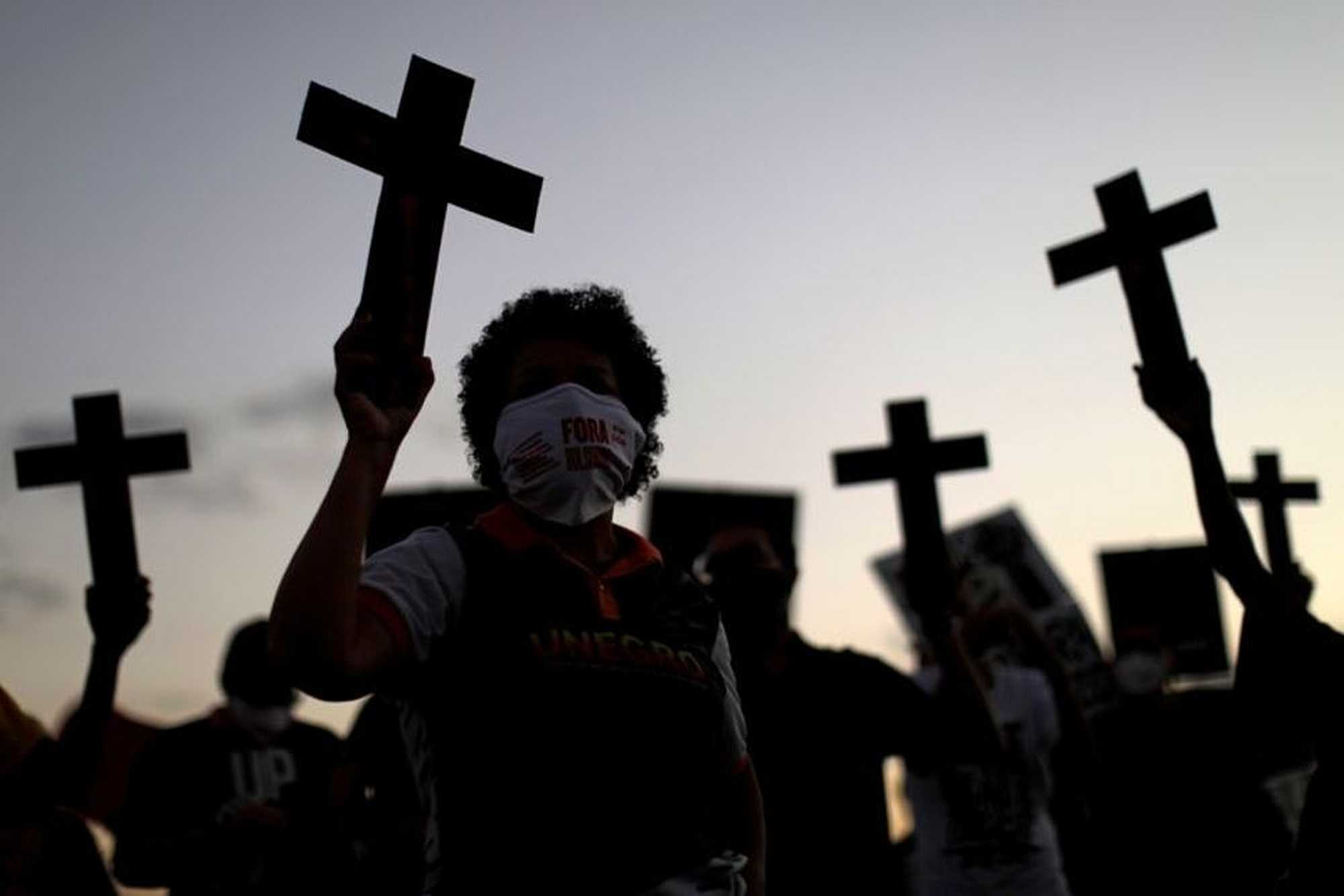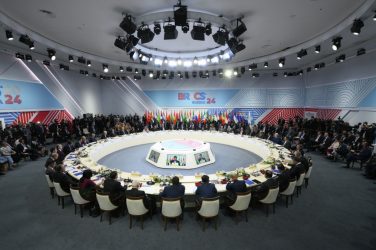Many writers and filmmakers claim artistic expression is more powerful at transmitting the tragedy and suffering of a people than is theory. Articles on the Brazilian crisis featured in the corporate media at least prove their point on how mainstream journalism is no substitute for the arts when it comes to getting to the grain of political truths. Yet recent films have not neutralized the need for conceptual and historical analysis, and novels have fared little better. Film references would have to zoom into the pentimenti, Bacurau or The Edge of Democracy, to retrieve Entranced Earth (1967) or A Grande Feira (1961). Layered into these works is the timeless repression of progressive politics and upper class vengeance against grassroots organizations seeking to reform landownership.
Listening to the current picture suggests the pandemic is not so much the result of climate crisis as its accelerator. And listen we must to the trashy phraseology of Bolsonaro’s US-residing pseudo-philosopher guru, to the flippant philosophical flights of his former secretary of state, and closer still to the ultraconservative social criticism of the former Commander of the Army, who warranted his rise as the project of a non-declared and anti-constitutional “Military Party”.
Brazil’s parallel universe would then appear less as cognitive dissonance than one incarnating power-obsessed lunacy. Hegemonic think tanks abound mainly to produce flak. The measure of their success lies in the confusion created for a population with ever diminishing means by which to reach economic and political truths. As in the U.S., new form fascism has given up on reason. Manufactured consent has surrendered to poverty-induced anguish transformed into rage.
With structural links to the military and judiciary, Brazil’s dominant class has awoken with nostalgic dreams of days gone by when only diplomats would become philosophers and authors. While white supremacy unites it to the business elite, the Trump/Bannon-supported group now in power is not the same as the exuberant jet setters of the past. Single-handedly tilting balance sheets in foreign spending, the rich of the 1990s used to dash madly to the consumer meccas of Miami or New York (with the must stop in Disney World slipped in for pleasure). The new group rules by vetoing and its courtiers reach for their guns when they face a reasonable policy or bill.
The background of this broad military would-be cast has been brilliantly depicted in the recently published collective volume, Os Militares e a Crise Brasileira (The Military and the Brazilian Crisis), edited by João Roberto Martins Filho (São Paulo: Alameda, 2021). A host of scholars takes on the task of cutting through the falsehoods belying the military’s strategies at periodically retaking power in a Republic they contend to have founded.
The triangular relationship between churches, military and large landowners (latifundiários) driven by blind hatred of socialists, feminists and Afro-Brazilians matches the standard structure of far-right groups. What is most striking with this local Triumvirate of Liars is the contempt with which it considers its own people and the psychological warfare operated to divert public attention from the modes of economic reproduction securing its leaps to hegemony. Following the coup against ex-president Dilma Rousseff, public opinion polls published by private media outlets ranked the military as the most trustworthy of the country’s professional corporations. Academics failed to make it even to the bottom rung of the scale. Once they emerged from the barracks, a quite different scenario unfolded. Instead of being the reasonable watchdogs keeping Bolsonaro in check, both have proved to be united in a common mission: retake whatever wealth was lost to the financial oligarchy by looting the country of its industrial and natural resources.
Brazil has one of the highest rates of income inequality in the world. Roughly a half of total national income sits concentrated with the 1 percent while not less than 95 percent circulates within the top 5 (WID/Folha/Oxfam). After two wretched labor reforms, a constitutional amendment freezing any increase in public expenditures for twenty years – save for debt instalments and raises for senior state and military personnel – and a privatization campaign bent on ridding society of any publicly-owned property, recent indicators point to half of the population going hungry and over ten percent of its 220 million living on the verge of starvation. The most recent numbers point to 3 out of 10 citizens as having no work-related income whatsoever, this in a country whose tax policy for the rich equates it to a tax haven.
So the answer to the question: “where did all the fascists come from?” is not only that they never went away, but that their property and privileges have allowed them to silently plan a self-righteous return committed to crushing (left-wing) corruption.
Officially, retired Army Captain Jair Bolsonaro ran a presidential campaign based on three major overhauls. On the moral and cultural fronts, he sought to reinstate conservative values of patriarchal plutocracy and white supremacy. Although Bolsonaro’s faction has jettisoned the budgets for higher public education and scientific research, as a cultural revolution it has failed miserably. While the damage is sizable, repairing it is still within reach – provided he be ousted by 2022.
By contrast, the damage caused by the economic overhaul might be long standing. Privatizations have run rampant. The looting of public property, national wealth and the commons stands as one of the most disgusting examples of primitive accumulation and extraction by dispossession to be found on the planet. The bounty includes land delimited to Indigenous peoples, who now face the next step in a genocidal threat to their existence coming from gold and mineral rushers financed by Canadian-based multinational mining firms and perhaps pension funds.
Some 80 percent of Brazil’s population has been corralled into huge, overpopulated urban centers, thus transforming land the size of the U.S. into fields for soya and cattle. Meanwhile, the DOJ-advised Lava Jato court of exception used the card of corruption to jettison Brazil’s primary engineering firms and heavy industry. Typical of lawfare, Lava Jato went after executives to bring down entire companies. It indicted politicians with the overall objective of discrediting the PT (Workers’ Party) as a whole. By contrast, tax evaders have accumulated well over 1 trillion dollars in offshore accounts (GFI).
With the high-end industrial market exposed, lesser firms sought to cash in on the void by forcing a sell-off of the Pre-Salt oil field shares and undermining the development of the country’s nuclear energy corporation by throwing its former CEO in jail. Even its scant network of private banks bulked as Chicago-boy and ex-Pinochet associate, Finance Minister Paulo Guedes, slid the firm he help found, BTG Pactual, into the privatization free-for-all, making it the faster growing investment bank in Bolsonaro’s Brazil.
The Minister’s men have privatized billions in public utilities and spiked equities to record levels. Now they feast over the biggest catch, the federal electricity generation and transmission company, Eletrobras. These sell-offs require approval by the Senate and compliance of the Supreme Court. Given what is known of the involvement of various justices in Lava Jato’s now discredited operations, thanks to detained whistleblower Walter Delgatti, approval should be forthcoming.
As for the political overhaul, fierce competition at the top edges the country closer to some form of social collapse. The Workers’ Party has rightly been criticized for its backoffice negotiations with the top business class as well as alliances with parties created during the dictatorship. In 2002, Lula da Silva was elected president through the overwhelming support of the huge working class, though he would soon choose a path of compromise with the country’s largest firms and banks. That Lula’s two terms in office raised the standard of living of the middle and working class is not false, despite how he did so without socializing any part of the State. For the short time it lasted, some saw his success as testimony to the half-truths advocated by trickle-down economists. Closer to the point is how under-efficiently Brazil’s industry had been operating since emerging from spiralling inflation, a credit crunch and monetary devaluation in the late 1990s.
Apart from protecting the interests of large landowners and the financial oligarchy, Bolsonaro has no political project. His rule-by-pen includes vetoing the purchase of various Covid-19 vaccines. His negationism has propelled him into the position of the international pusherman for hydroxychloroquine and gun ownership as preventive treatment either against Covid or political defeat.
Although not born into privilege, Bolsonaro has reaped profit from decades of networking amongst his former Agulhas Negras Military Academy mates. He has planted over 6000 mainly Army personnel into various civilian positions in the federal administration. Hallucinating from paranoia-inducing literature on history and international relations, Brazil’s generals believe their own people are their most ruthless enemy. In the end, talk of the supreme threat posed by organic cultural Marxism poorly muffles their white supremacy.
Still, claims the country is headed toward civil war are overblown, which is not to deny a slow and steady erosion of the rule of law. Democracy may not even be the main issue here, while ownership of public property and national wealth has to be. Bolsonaro’s psychopathic reactions to Covid-related deaths feeds into his constant incitement of police violence to force through his agenda. Last June, police massacred twenty-seven persons in the community of Jacarezinho in Rio de Janeiro, while state police mutinies are suggestive of conflicts to come.
Like Trump, Bolsonaro runs the federal administration through a gang. His three sons hold elected offices in the Senate, and State and Municipal legislatures, though each works for the Executive in parallel functions: either in the fake news-producing “Cabinet of Hate”, the secret Health Cabinet (that has been mismanaging the pandemic) or in undisclosed committees cutting arms and security tech deals mainly with Israel and the G.O.P. One of his sons is alleged to have participated in organizing the assault on the U.S. Capitol.
The president is a facilitator. His paramilitary allies have infiltrated the Rio de Janeiro sectors of the Federal Police and Judiciary and have deposed state governors. The president is also an obstructer. While the assassination of Marielle Franco is still unsolved, Bolsonaro has taken over police agencies state by state. Should the outcome of the 2022 elections not go his way, federal institutions and state governments will confront the risk of a QAnon-type attack with military support.
As a capitalist system edges toward instability at the national level, its future tends to rest with the country’s dominant business class. Average salary has receded below the R$ 1000 (US$ 200) a month mark for the first time in a decade despite nominal GDP holding steadily within the top ten, even in pandemic times. With the public now isolated from knowledge by the channeling of fake news through discussion groups on WhatsApp, any recovery in the short term seems unfeasible. Of the big four media outlets, all but one are explicitly bolsonarist, while a new affiliate funds Covid-19 deniers posing as journalists on prime time.
Media concentration directly results from concentrated land ownership, underscoring yet again the need to break with current private property law. The Bolsonaro clan’s obsession with property ownership drives deforestation in the Amazon rainforest, 20 percent of which has been razed to the ground already. When added to what remains of the Atlantic Coastal Forest, the Everglades of the Pantanal and dispersed patches of pristine nature, the scale of Bolsonaro’s destruction is devastating.
What can be seen through this sound is a class war being waged from the top. Whether the 2022 presidential elections take place or not, the aim has to be to socialize the economy and transform citizenship rights into concrete well-being so as to break the hegemony of white supremacy. Brazil’s majority population is Black. Recognition of gender and racial diversity is the first step toward building a future of equality. Nationwide protests have successively brought millions to the streets as they have also heightened the risk of backlash from the Military Party. In its thinking, this Party espouses the obscure. In its mismanagement of the Global Pandemic and through its pathetic clown of a president, the Party has also willfully cultivated its own stupidity.
Norman Madarasz, Ph.D., is from Montréal and works as professor of Political Philosophy and Literature at PUC-RS, in Porto Alegre, Brazil. Author and editor of several books, namely Obstruções à Justiça (Porto Alegre: Editora Fi, 2017), he has written extensively on Brazil.













